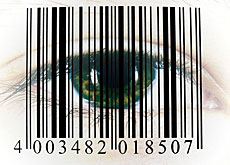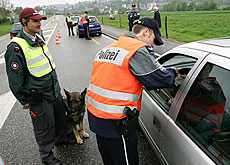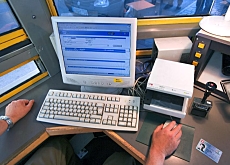Swiss privacy regime “too lax” for Schengen

Switzerland must do more to protect citizens from privacy abuses before joining a European database monitoring the cross-border movement of people, a watchdog warns.
Other European countries have far stricter safeguards against possible violations by the Schengen Information System (SIS), according to the Swiss Data Protection Commission.
The Swiss voted for a closer cooperation with the European Union over security and asylum by approving the Schengen and Dublin accords in July last year.
Part of this commitment is that Switzerland must now participate in SIS by the end of 2008. The database stores personal information – that can be exchanged between participating countries – on wanted criminals and people who are denied the right to enter or settle in the Schengen zone.
A new version of the system – SIS II – will also contain biometric data to counter terrorism, restrict the movement of known troublemakers (such as football hooligans) and keep tabs on people under criminal investigation.
But Bruno Baeriswyl, president of the Swiss Data Protection Commission, believes Switzerland does not have adequate measures in place to stop this information from being used for the wrong purposes.
“The Swiss authorities have concentrated on tightening security and protecting borders in recent years. But they have been absent-minded about putting the necessary checks and balances into place to protect individual rights,” he told swissinfo.
“While we support the idea of SIS, we also feel that cooperation with this system should not be at the expense of individual citizens.
“Other European countries do far more to safeguard the fundamental right of privacy. It is our task to see that Switzerland reaches the same level as these countries.”
Cantonal funding
Baeriswyl also complained that the Swiss Data Protection Commissioner, Hanspeter Thür, is appointed by the federal executive and not by parliament.
“The commissioner should be voted in by parliament so that the people get a say in who holds this responsible post. At the moment it can hardly be said that the commissioner is truly independent,” Baeriswyl said.
Another potential obstacle to the correct implementation of SIS in Switzerland is a lack of funding at cantonal level.
The 26 Swiss cantons will play a key role in the project as they control policing at a regional level. But a cantonal survey conducted by the commission found that none of the 20 respondents felt they had sufficient funds to properly adapt their data protection systems to meet the new demands.
Ursula Stucki, vice-president of the commission, fears that cantonal data protection officers could be powerless to carry out their duties.
“How can [cantonal] data protection commissioners be called independent if they do not have the resources to carry out their duties properly?” she told swissinfo.
“They need professional tools to do the job, but data protection appears to be low on the list of priorities for many cantons.”
swissinfo, Matthew Allen
The Swiss Data Protection Commission – a watchdog that represents cantonal commissioners – is a separate body to the office of the Federal Data Protection and Information Commissioner, Hanspeter Thür – who is appointed by the federal government.
Originally designed for eight countries and now used by 15, SIS has reached the limits of its capacity. It contains personal information on one million individuals – 800,000 of which relate to persons denied the right to enter or stay in the Schengen zone and 15,000 on persons wanted for criminal offences.
SIS II was scheduled to begin operating in 2007, but it now looks unlikely to be up and running before the end of 2008. Some 27 countries both inside and outside the European Union will be part of the new system.

In compliance with the JTI standards
More: SWI swissinfo.ch certified by the Journalism Trust Initiative




You can find an overview of ongoing debates with our journalists here . Please join us!
If you want to start a conversation about a topic raised in this article or want to report factual errors, email us at english@swissinfo.ch.